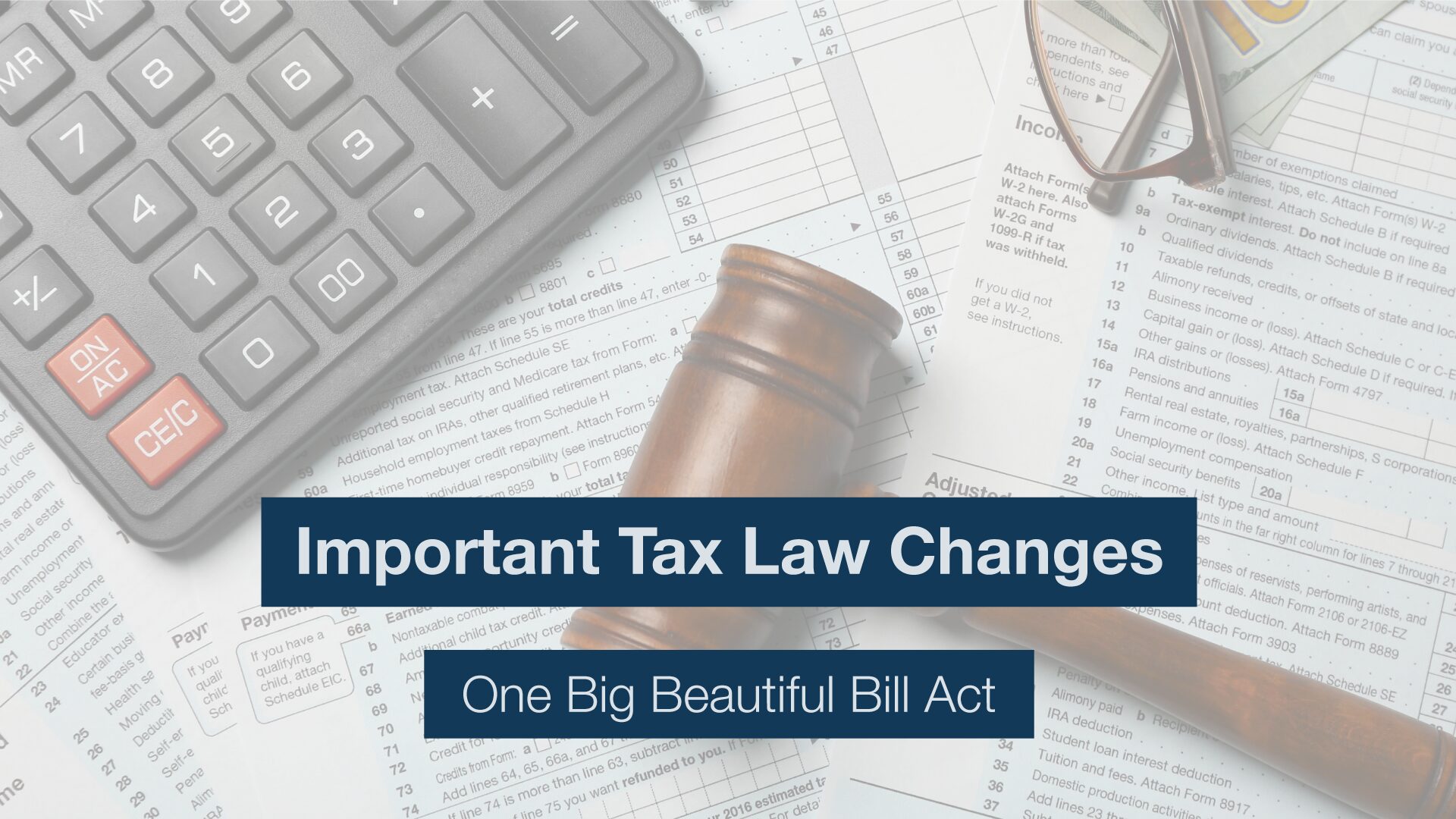
By: Kevin Doll, CFP®
Senior Financial Advisor
While fireworks were being set off to celebrate the 4th of July, President Trump signed the One Big Beautiful Bill Act into law. Probably the most notable update isn’t really a change, rather an extension of current tax laws scheduled to revert to older laws after 2025. You can read a summary of tax changes from the bill here, but below is an outline of ones we think will impact most taxpayers.
- Making current tax brackets permanent (no sunset for higher tax brackets).
- Personal exemption elimination was made permanent.
- Standard deduction increases were made permanent.
- The QBI deduction for certain business owners was made permanent.
- Increase of SALT (state, local, and real estate taxes) deduction from $10,000 to $40,000 until 2030 (phase out starts @ $500k), starting in 2025. This is probably the biggest change for most taxpayers.
- Creation of a 0.5% floor for itemized deductions related to charity. Much like the current floor for medical deductions, you can only deduct charitable contributions exceeding 0.5% of Adjusted Gross Income.
- $1,000 ($2k if MFJ) above the line deduction for charitable donations.
- Temporarily make up to $25,000 of tip income deductible for individuals in traditionally and customarily tipped industries for tax years 2025 through 2028; deduction phases out at a 10 percent rate when adjusted gross income exceeds $150,000 ($300,000 for joint filers).
- Temporarily make up to $12,500 ($25,000 for joint filers) of the premium portion of overtime compensation deductible for itemizers and non-itemizers for tax years 2025 through 2028; the deduction phases out at a 10 percent rate when adjusted gross income exceeds $150,000 ($300,000 for joint filers).
- Temporarily make auto loan interest deductible for itemizers and non-itemizers for new autos with final assembly in the United States, for tax years 2025 through 2028. The deduction is limited to $10,000 and phases out at a 20 percent rate when income exceeds $100,000 for single filers and $200,000 for joint filers.
- Permanently increase the estate tax exemption to an inflation adjusted $15M starting in 2026 – no estate tax for most married couples who have an estate under $30M.
We have had several questions regarding the taxability of Social Security and whether the Bill eliminated them. Unfortunately, the Bill doesn’t eliminate taxes on Social Security but rather introduces a temporary deduction beneficiaries can claim to lower their federal income tax.
Notably, that deduction applies to all a senior’s income, not just to Social Security benefits. The Bill temporarily adds a senior deduction of $6,000 for each qualifying individual for both itemizers and non-itemizers that phases out when modified adjusted gross income exceeds $75,000 ($150,000 if married filing jointly), available from 2025 through 2028.
Having a child in the next 4 years? They could be the beneficiary of a new “Trump Account.” The government will seed the account with $1,000 for children born from 2025-2028. And parents can contribute up to $5,000 per year (including up to $2,500 tax free from a parent’s employer). Account holders can make partial withdrawals when they turn 18 and access the full amount at age 25, but only for “qualified purposes” including paying for college, starting a business, or buying a first home. They get full access to the funds at age 30 to use for any purpose.
This sounds like a great deal, but the caveat is once cashed out, distributions will be taxed as long-term capital gains if the funds are used for a qualifying purpose. Money spent on anything else will be treated as ordinary income. While the free $1,000 may be no-brainer, other options like 529 Plans probably offer a greater tax benefit for additional savings including tax free growth, tax free distributions for qualified expenses, no age requirements for distributions, and the ability to roll assets to other beneficiaries or even a Roth IRA.
We encourage you to click the link to review other tax changes that may impact your specific circumstances and to have a conversation with your accountant or financial advisor to determine whether they warrant any adjustments you may need to make.
IMPORTANT DISCLOSURE INFORMATION: Please remember that past performance is no guarantee of future results. Different types of investments involve varying degrees of risk, and there can be no assurance that the future performance of any specific investment, investment strategy, or product (including the investments and/or investment strategies recommended or undertaken by PDS Planning, Inc. [“PDS”]), or any non-investment related content, made reference to directly or indirectly in this blog will be profitable, equal any corresponding indicated historical performance level(s), be suitable for your portfolio or individual situation, or prove successful. Due to various factors, including changing market conditions and/or applicable laws, the content may no longer be reflective of current opinions or positions. Moreover, you should not assume that any discussion or information contained in this blog serves as the receipt of, or as a substitute for, personalized investment advice from PDS. To the extent that a reader has any questions regarding the applicability of any specific issue discussed above to his/her individual situation, he/she is encouraged to consult with the professional advisor of his/her choosing. PDS is neither a law firm nor a certified public accounting firm and no portion of the blog content should be construed as legal or accounting advice. A copy of the PDS’ current written disclosure Brochure discussing our advisory services and fees is available for review upon request or at www.pdsplanning.com. Please Note: PDS does not make any representations or warranties as to the accuracy, timeliness, suitability, completeness, or relevance of any information prepared by any unaffiliated third party, whether linked to PDS’ web site or blog or incorporated herein, and takes no responsibility for any such content. All such information is provided solely for convenience purposes only and all users thereof should be guided accordingly. Please Remember: If you are a PDS client, please contact PDS, in writing, if there are any changes in your personal/financial situation or investment objectives for the purpose of reviewing/evaluating/revising our previous recommendations and/or services, or if you would like to impose, add, or to modify any reasonable restrictions to our investment advisory services. Unless, and until, you notify us, in writing, to the contrary, we shall continue to provide services as we do currently. Please Also Remember to advise us if you have not been receiving account statements (at least quarterly) from the account custodian.



